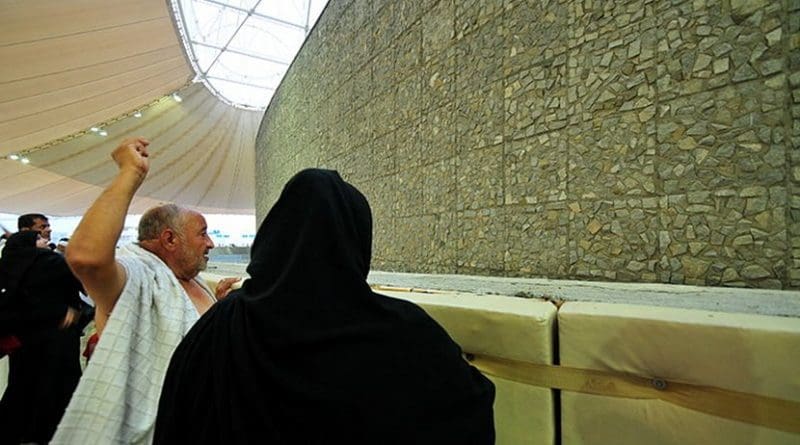Saudi Arabia: Pilgrims Prepare For ‘Stoning Of Satan’ Ritual
By Arab News
After converging on the plains of Arafat on Thursday for the most important ritual of Hajj, Muslims pilgrims descended to Muzdalifa to prepare for the final stages of the annual pilgrimage.
As the sun set, they began moving to the rocky plain to gather pebbles to throw at stone columns symbolizing the devil at another location called Jamarat on Friday, which marks the first day of Eid Al-Adha (feast of sacrifice).
Hajj and Umrah Minister Mohammed bin Saleh Taher Bentin confirmed that more than 2 million pilgrims have managed to reach Arafat’s high level easily, with more than 20,000 buses and similar private cars in operation.
On Thursday night, the eve of Eid Al-Adha, Saudi King Salman arrived in Mina to review the services offered to pilgrims, the Saudi press Agency said.
Statistics from the Ministry of Hajj and Umrah showed that as of Thursday, the total number of local and foreign pilgrims reached 2,352,122. Hundreds of thousands more have been turned away by security forces for lack of permit to perform Hajj.
High point of Hajj
On Thursday, with temperatures pushing 40 degrees Celsius under the desert sun, the faithful climbed the hill east of Makkah where Prophet Muhammad (peace be upon him) gave his last sermon some 14 centuries ago.
Standing at Mount Arafat in prayer before sunset on 9th Dul Hijjah is the high point of Hajj.
Other worshippers who had been praying in the nearby Mina area ascended in buses or on foot from before dawn as security forces directed traffic and helicopters hovered overhead.
Some of the faithful carved out seats on the craggy hillside, carrying umbrellas to protect themselves from the sun. Others filled nearby roads, undeterred by the scorching heat of the sun.
Men and women from nearly every country in the world gathered side by side, some crying on their neighbor’s shoulder.
An elderly Syrian pilgrim sitting on the hilltop shouted out, “Oh God, take revenge on the oppressors.” Others assembled around him responded, “Amen.”
Awfa Nejm, from a village near Homs, said: “We ask God to protect Syria and its people and return it to the way it was before.”
Twenty-seven-year-old Amin Mohammed from Nigeria said he was praying for peace in his country.
Saudi Arabia said more than 2.3 million pilgrims, most of them from outside Saudi Arabia, had arrived for the five-day ritual, a religious duty once in a lifetime for every able-bodied Muslim who can afford the journey.
No politics, please
Sheikh Saad Al-Shathri, a senior Saudi cleric, delivered a midday sermon denouncing terrorism and violence against civilians.
“Sharia came to preserve the security of nations and cultivate benevolence in (people’s) hearts,” he said, referring to the Islamic legal and moral code derived from the teachings of the Qur’an and the traditions of the Prophet.
He urged pilgrims to set aside politics during the Hajj and come together with fellow Muslims.
“This is no place for partisan slogans or sectarian movements which have resulted in great massacres and the displacement of millions,” he said.
Security had been tight, with officials saying they have taken all necessary precautions this year, with more than 100,000 members of the security forces and 30,000 health workers on hand to maintain safety and provide first aid.
A crush in 2015 which killed hundreds occurred when two large groups of pilgrims arrived together at a crossroads in Mina, a few kilometers east of Makkah, on their way to Jamarat. It was the worst disaster to strike Hajj for at least 25 years.
Saudi Arabia stakes its reputation on its guardianship of Islam’s holiest sites — Makkah and Medina — and organizing the pilgrimage. Saudi state television on Thursday morning showed a new kiswa, the cloth embroidered with verses from the Qur’an, being placed over the Kaaba in Makkah’s Grand Mosque. Pilgrims will return to pray there at the end of Hajj.
Abdelhadi Abu Gharib, a young Egyptian pilgrim, prayed in Muzdalifa before collecting stones for Friday’s ritual.
“The scene today in Arafat confirms that Muslims are not terrorists and that Islam is the greatest religion,” he said. “God has blessed us with Islam.”

